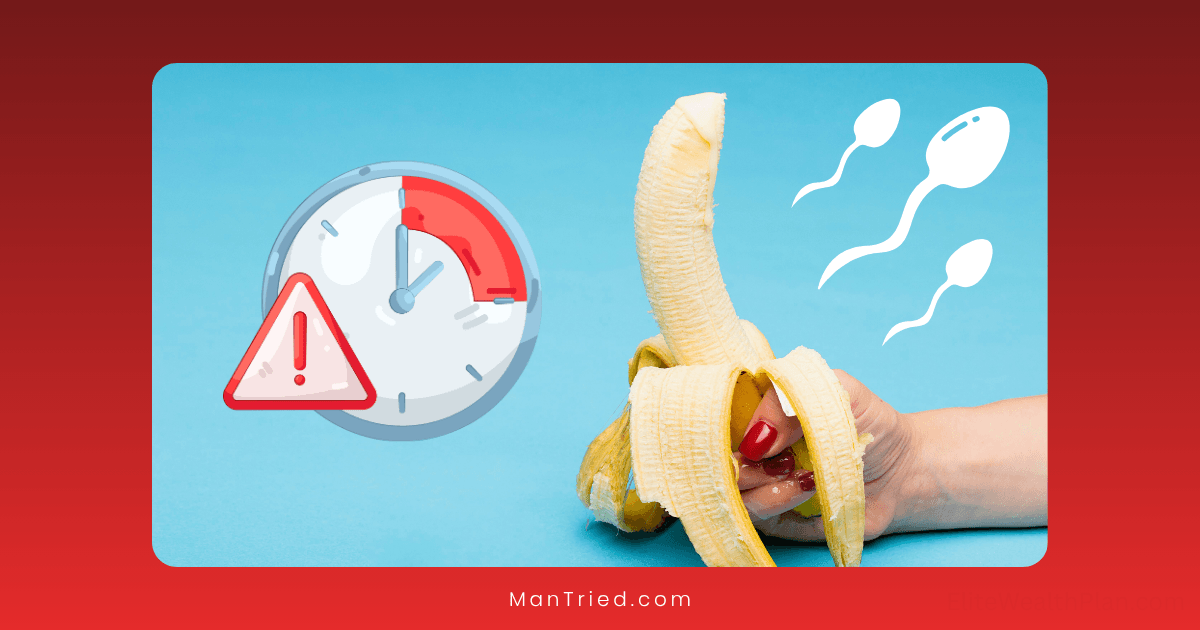When Orgasm Won’t Come: Understanding Delayed Ejaculation

While premature ejaculation often dominates the conversation about male sexual dysfunction, there’s another condition that can be equally distressing yet receives far less attention: delayed ejaculation (DE). Affecting approximately 5-10% of sexually active men, delayed ejaculation can cause significant frustration, relationship strain, and even impact fertility.
This comprehensive guide explores the causes, symptoms, and treatment options for delayed ejaculation, offering hope and practical solutions for those affected.
What is Delayed Ejaculation?
Delayed ejaculation occurs when a man takes an extended period to reach orgasm and ejaculate, or is unable to ejaculate at all, despite adequate sexual stimulation. According to the Cleveland Clinic, while most men typically ejaculate within a few minutes of stimulation, those with DE may require 30 minutes or more, and some may not be able to ejaculate at all.
The condition is formally diagnosed when:
- The symptom has been present for at least 6 months
- It occurs in almost all or all (75-100%) sexual encounters
- It causes marked distress to the individual
Types of Delayed Ejaculation
DE can be categorized in several ways, which helps determine the most effective treatment approach:
Based on Onset
- Lifelong DE: Present from the beginning of sexual maturity
- Acquired DE: Develops after a period of normal ejaculatory function
Based on Circumstances
- Generalized DE: Occurs regardless of the situation, partner, or type of stimulation
- Situational DE: Only happens in specific circumstances (e.g., with certain partners or during particular activities)
Based on Severity
- Mild to moderate DE: Ejaculation is possible but takes significantly longer than desired
- Severe DE or Anejaculation: Complete inability to ejaculate during partnered sexual activity
- Anorgasmia: Inability to achieve orgasm, with or without ejaculation
The Physical and Psychological Impact
The effects of delayed ejaculation extend beyond the physical aspect of sex:
For the Individual
- Frustration and disappointment
- Physical discomfort or pain from prolonged sexual activity
- Feelings of inadequacy or sexual failure
- Anxiety about sexual performance
- Avoidance of sexual encounters
For the Partner
- Feelings of unattractiveness or sexual inadequacy
- Physical discomfort from extended intercourse
- Confusion or hurt about their partner’s inability to climax
- Reduced sexual satisfaction and intimacy
For the Relationship
- Communication challenges around sexual needs
- Decreased frequency of sexual activity
- Tension and conflict
- Fertility challenges when trying to conceive
Understanding the Causes
Delayed ejaculation typically results from a complex interplay of physical, psychological, and lifestyle factors. Identifying the underlying cause is crucial for effective treatment.
Physical Causes
Neurological Factors
- Diabetic neuropathy
- Multiple sclerosis
- Spinal cord injuries
- Stroke
- Nerve damage from surgeries (particularly prostate surgery)
Hormonal Imbalances
- Low testosterone levels
- Elevated prolactin levels
- Hypothyroidism
Anatomical Issues
- Ejaculatory duct obstruction
- Retrograde ejaculation (when semen enters the bladder instead of exiting through the penis)
Age-Related Changes
- Decreased penile sensitivity
- Reduced muscle tone in pelvic floor
- Changes in nerve conduction
According to a study published in PMC, neurological conditions account for approximately 30% of organic DE cases.
Medication-Induced DE
Several medications can interfere with the ejaculatory process:
Antidepressants
- Selective Serotonin Reuptake Inhibitors (SSRIs) like fluoxetine, sertraline, and paroxetine
- Serotonin-Norepinephrine Reuptake Inhibitors (SNRIs)
- Tricyclic antidepressants
Other Medications
- Antipsychotics
- Alpha-blockers for high blood pressure or prostate conditions
- Certain diuretics
- Some anti-seizure medications
- Opioid pain medications
The Mayo Clinic reports that up to 80% of men taking SSRIs experience some form of sexual dysfunction, with delayed ejaculation being a common side effect.
Psychological Causes
Performance Anxiety
- Fear of not satisfying a partner
- Concern about taking too long
- Previous negative sexual experiences
Relationship Issues
- Unresolved conflicts
- Poor communication
- Trust issues
- Lack of attraction
Individual Psychological Factors
- Depression and anxiety disorders
- Religious or cultural guilt about sex
- Traumatic sexual experiences
- Fear of pregnancy or STIs
Conditioning Factors
- Idiosyncratic masturbation patterns (e.g., high-pressure or high-speed techniques)
- Pornography dependency
- Specific sexual fantasies that differ from real-life experiences
Lifestyle Factors
- Excessive alcohol consumption
- Recreational drug use
- Fatigue and stress
- Infrequent sexual activity
Diagnosis: The Path to Understanding
Diagnosing delayed ejaculation typically involves several steps:
Medical History
A thorough review of:
- Sexual development and experiences
- Onset and pattern of delayed ejaculation
- Current medications
- Chronic health conditions
- Previous surgeries
- Alcohol and drug use
Physical Examination
- Genital examination to check for anatomical issues
- Neurological assessment to evaluate nerve function
- Prostate examination
Laboratory Tests
- Hormone levels (testosterone, prolactin, thyroid hormones)
- Blood glucose to check for diabetes
- Other tests based on suspected causes
Psychological Assessment
- Evaluation of anxiety, depression, and other mental health concerns
- Assessment of relationship dynamics
- Exploration of attitudes toward sexuality
Treatment Approaches: Finding Solutions
Treatment for delayed ejaculation should be tailored to the underlying cause. A multi-modal approach often yields the best results.
For Physically-Caused DE
Medication Adjustments
- Switching antidepressants to those with fewer sexual side effects
- Dose adjustments of current medications
- Adding medications that may counteract sexual side effects
Hormone Therapy
- Testosterone replacement for low testosterone levels
- Medications to lower prolactin levels, such as cabergoline
- Thyroid hormone replacement for hypothyroidism
Specialized Treatments According to Urology Specialists of Austin, treatments may include:
- The P-Shot (platelet-rich plasma injection) to enhance penile sensitivity
- Penile vibratory stimulation using high-speed vibrators
- Electroejaculation (primarily used in fertility settings)
For Psychologically-Caused DE
Sex Therapy
- Sensate focus exercises to reduce performance pressure
- Masturbation retraining to align solo practices with partnered experiences
- Communication skills for discussing sexual needs
Cognitive-Behavioral Therapy (CBT)
- Identifying and challenging negative thoughts about sex
- Reducing performance anxiety
- Developing healthier sexual attitudes
Mindfulness Practices
- Present-moment awareness during sexual activity
- Focusing on physical sensations rather than performance
- Stress reduction techniques
For Relationship-Based DE
Couples Therapy
- Improving communication about sexual needs
- Resolving relationship conflicts
- Rebuilding trust and intimacy
Sensual Exploration
- Experimenting with different forms of stimulation
- Creating a pressure-free sexual environment
- Focusing on pleasure rather than orgasm
Lifestyle Modifications
- Reducing alcohol consumption
- Quitting smoking
- Regular exercise to improve blood flow and hormone balance
- Stress management techniques
- Adequate sleep
Medications That May Help
While the FDA hasn’t approved any medications specifically for delayed ejaculation, several are used off-label with varying success:
- Cyproheptadine: An antihistamine that counteracts the sexual side effects of SSRIs
- Buspirone: An anti-anxiety medication that may help with psychologically-based DE
- Amantadine: Originally used for Parkinson’s disease, may help with SSRI-induced DE
- Oxytocin: The “bonding hormone” that plays a role in orgasm
- Yohimbine: An herbal supplement that may improve sexual function
The University of Utah Health notes that medication effectiveness varies significantly between individuals, and finding the right option often requires trial and error.
Self-Help Strategies
Several self-help approaches can complement professional treatment:
Communication Techniques
- Express needs and concerns openly with partners
- Discuss what types of stimulation work best
- Remove pressure by focusing on pleasure rather than orgasm
Physical Exercises
- Kegel exercises to strengthen pelvic floor muscles
- Regular cardiovascular exercise to improve blood flow
- Yoga positions that increase pelvic blood flow
Masturbation Retraining
- Adjusting grip pressure and speed to better match the sensations of partnered sex
- Incorporating lubricants that simulate the feel of natural bodily fluids
- Reducing pornography use that may be creating unrealistic expectations
When to Seek Professional Help
Consider consulting a healthcare provider if:
- Delayed ejaculation causes personal distress
- The condition is affecting your relationship
- You’re experiencing other sexual or urinary symptoms
- You’re trying to conceive
- The problem developed suddenly or after starting a new medication
Resources like the American Association of Sexuality Educators, Counselors and Therapists (AASECT) can help locate qualified sex therapists and counselors.
Real Stories: Finding Solutions
James’s Journey with Medication-Induced DE
James, 42, developed delayed ejaculation after starting an SSRI for depression. “It was frustrating for both me and my wife,” he shares. “I worked with my psychiatrist to adjust my medication dosage and added a low dose of buspirone. This, combined with more direct stimulation during sex, helped me reach orgasm more consistently without sacrificing my mental health treatment.”
Michael’s Experience with Psychological DE
Michael, 35, traced his delayed ejaculation to performance anxiety and specific masturbation habits. “Working with a sex therapist helped me understand how my solo sexual practices were making it difficult to climax with a partner,” he explains. “Through mindfulness techniques and gradually changing my masturbation routine, I was able to sync my body’s responses to better match partnered experiences.”
The Path Forward
Delayed ejaculation, while challenging, is a treatable condition. With the right approach—whether medical intervention, psychological support, or lifestyle changes—most men can experience improvement. The key is to:
- Seek professional guidance to understand the underlying causes
- Address both physical and psychological factors
- Maintain open communication with partners
- Be patient with the treatment process
- Focus on overall sexual pleasure rather than just the goal of ejaculation
By approaching delayed ejaculation with knowledge, patience, and appropriate treatment, it’s possible to restore sexual satisfaction and confidence.
Have you found particular strategies helpful in managing delayed ejaculation? Share your experiences in the comments below.






